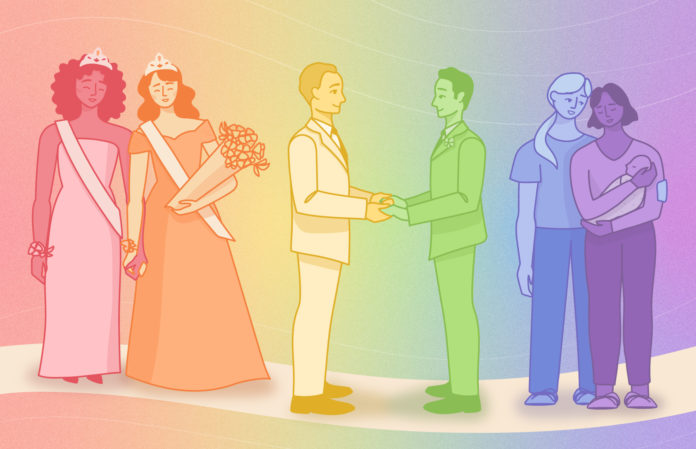
In comparison to other states, California is one of the most progressive when it comes to protecting LGBTQIA+ individuals and their rights. However, the fight for equality is far from over. Throughout history, many LGBTQIA+ people have dedicated and sacrificed their lives to fight for the same basic rights and protections as heterosexual, cisgender individuals. And while the struggle to secure civil rights for LGBTQIA+ individuals has had many victories, it is a struggle that never ends.
In Alabama, Arizona, Florida, Georgia, Illinois, Iowa, Kansas, Kentucky, Louisiana, Missouri, New Jersey, Oklahoma, Rhode Island, South Carolina, South Dakota and Tennessee, “Don’t Say Gay” bills have been proposed and passed — homophobic legislation which claims to protect parents, schools, and children from LGBTQIA+ influence and exposure. Although some bills — such as SB 613 in Georgia proposing restrictions on discussions of gender and sexual orientation in the classroom — have not been passed, they still represent an attack on the rights of vulnerable LGBTQIA+ children who are trying to grapple with their identities in an already-homophobic world.
On February 22, Texas Gov. Greg Abbott released an ordinance encouraging mandated officials (teachers, physicians, law enforcement, social workers, etc.) to report parents of transgender children undergoing gender-affirming care to local child protective agencies. These bills, laws and ordinances claim to protect children, parents and schools by presenting the highly subjective view that conversations and education on sexual orientation have no place in schools. The leaders behind homophobic legislation also ignore what research and social science tell us about LGBTQIA+ youth (and individuals) as a particularly vulnerable population.
According to 2018 data from the FBI, 1,196 hate crimes were reported and investigated against LGBTQIA+ individuals. These are only the cases that have been reported and investigated by the FBI — actual hate crime rates are likely much higher. This data exemplifies how the general LGBTQIA+ population is at risk for experiencing hate crimes, motivated by homophobic ideologies such as those enmeshed in “Don’t Say Gay” legislation.
LGBTQIA+ youth are particularly at risk of harm at school. A study conducted by the U.S. Department of Health and Human Services and the Centers for Disease Control and Prevention reported that LGBTQIA+ high school students experienced higher levels of bullying (33%) than their heterosexual counterparts (17%). This study also revealed that LGBTQIA+ students attempted suicide at higher levels (23%) than their heterosexual counterparts (5%).
Additionally, the National Survey on LGBTQ Youth Mental Health 2021 reports that LGBTQIA+ youth of color have higher rates of attempted suicide than their white counterparts. This data makes it clear that if anyone needs protecting, it’s LGBTQIA+ youth who are continuously at risk of physical, emotional and psychological harm encouraged by legislation that aims to protect youth, teachers and parents.
I have seen endless news reports, social media posts and personal written accounts of LGBTQIA+ youth who have been hurt or had their lives taken by homophobic and transphobic people. It seems backwards that politicians want to protect heteronormative or cisgender people, when it is not them who are being persecuted for living their truth and loving who they want to love. To them, it is evidently the heterosexual, cisgender people who are at no risk for harm that need to be “protected” at the cost of those who truly need it. But one way to fight this legislation and protect LGBTQIA+ youth is by supporting the Equality Act.
The Equality Act, which is currently being moved through Congress, prohibits discrimination based on sex, sexual orientation and gender identity in areas such as public accommodations and facilities, education, federal funding, employment, housing, credit and the jury system. If passed, schools would benefit from this added protection as a place of public accommodation. Places of public accommodations include establishments that provide (1) exhibitions, recreation, exercise, amusement, gatherings or displays; (2) goods, services or programs; and (3) transportation services. While schools are not explicitly stated in the bill, we are hopeful that they will be covered under this jurisdiction as a place where discrimination is prohibited. However, supporting the Equality Act is not the only thing we can do to protect LGBTQIA+ rights.
In March, hundreds of students across the state of Florida participated in walkouts to protest the “Don’t Say Gay” bill, as many students in the state do not agree with the proposed legislation. The walkout at Winter Park High School was led and organized by juniors Will Larkins and Maddi Zornek. “We wanted to get the attention of our representatives, our senators, because the point is to show them that we are the ones in power,” Larkins said. While it is inspiring to see these young people take charge and actively become involved in the politics of their state, it is disheartening that this sort of legislation, which further stigmatizes LGBTQIA+ youth, continues to be passed by various state officials. Yet, student-led activism, such as that that in Florida, proves that homophobic legislation will not silence LGBTQIA+ communities and their allies.
The UC Berkeley community has always been known for its tenacious advocacy, and ongoing fight for justice and equity. As Berkeley students and community members, we must follow suit with the brave Florida youth that are standing up for what is right, and, in doing so, support the movement to more broadly protect LGBTQIA+ rights.
MSW Candidates Katia Mondragon and Cassangela Gainey contributed to this story.







